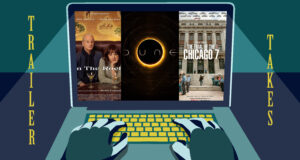Think back to the sweet, ignorant years of adolescence. You find yourself getting ready to go on—perhaps—your first date, arranging for your parents to drop you off and stressing over the usual I’m-still-a-dependent formalities.
Where are you most likely headed? The movies. Classic rom coms may have even inspired the idea in the first place. Family movie night, drive-thru cinemas, the ol’ dinner and movie classic—nothing brings Americans together like plopping down and watching a good movie.
Perhaps that’s why people give me concerned looks when I reveal that I haven’t watched that many movies. The reactions usually follow the same general steps:
- A random quote or reference to a random movie.
- The slight pause after said reference to allow for some sort of reaction.
- A shocked expression, antithetical to my famous blank stare. (I have lots of practice.)
- The contemptuous, “you’ve never watched ‘x’ movie?” (Free of charge)
- A shake of my head, pretending to be ashamed just for them to respond with a myriad of different ways to say they’re disappointed.
Movie references continue to dominate American popular culture. Quotes like “There’s no place like home” (Wizard of Oz) and “life is like a box of chocolates” (Forrest Gump) have become so ingrained into American vernacular that many forget which movies they even came from.
But this standard, American way of bonding can be inherently exclusionary in nature. Those who didn’t grow up watching movies certainly wouldn’t have a vast library of films to reference, which comes at the danger of being labeled “uncultured.” Yet, this apparent unculturedness only manifests when viewed through a traditional American lens—perhaps failing to adhere to American cultural expectations doesn’t suggest a lack of culture, but a different one altogether.
As a Korean-American, I can attest that American family movie nights don’t usually make up a cultural staple of Korean family bonding. And while cultural obligations to family run deep, sitting down with the whole family to watch a movie in a foreign language likely doesn’t appeal to many non-English speaking households.
Growing up, I remember countless times when I was called “uncultured” by my peers for not immediately getting an obscure movie reference. (Looking back, perhaps Forrest Gump wasn’t that obscure. But at 10 years old, I can say it most certainly was.) Throughout my childhood and even now, I’ve heard “unculturedness” being used as a light jab, usually without any malicious intent. But it’s due time to do away with this label.
In a similar vein, I’ve also heard “you didn’t have a childhood” as a common response to when someone says they haven’t watched ‘x’ show or didn’t get ‘y’ reference. Again, while this isn’t usually accompanied by any ill intention, it is quite the claim to say someone didn’t have a childhood for not watching a Hollywood Blockbuster film.
For a long time, I didn’t question these quips. After all, out of the top 100 domestically grossing movies of all time (adjusted for inflation, of course), I’ve only watched 16, and most of them were animated. (Here’s the link if you want to compare.)
But before writing me off as anti-American, uncultured and “no-childhooded,” hear me out. I’ve put a lot of thought into why exactly I haven’t, and still don’t, watched movies. What I’ve learned is that nostalgia often colors the memory with a gentle rose tint. Sometimes you don’t remember why you liked something, just that you did.
While many of my peers were forming connections and fond memories with movies, my family didn’t really fit the prerequisites to become a movie buff. My parents don’t speak English as their first language, so putting on an older American movie simply wouldn’t make sense. As a child, I would hear of a “must-watch” movie at school, knowing full well that my parents would say I “must-wash” the dishes instead of “must-watch” a movie. (I’m being so serious right now. Those are words my mother told me.)
Movies never solidified themselves into the daily fabric of my childhood and, similarly, never became a staple of my identity. I never attached importance to my favorite celebrity role model, never snuggled up under fuzzy blankets with a popcorn bucket, and never understood the Forrest Gump impressions my friends did at the lunch table. In a way, they tangentially brushed up on my life, sporadically reminding me of how different my family was than a traditional American one.
But does that mean I didn’t have a childhood? As a kid, at times I thought so. When countless peers tell you the same thing, the desire to fit in supersedes any considerations of cultural pride.
Yet with this realization also came a greater one: the cultural expectation to know countless movie references and niche films often doesn’t consider the unique cultural and family backgrounds an individual has. The American pop-culture creates a strong ‘us/them’ mentality, a ‘cultured/uncultured’ dichotomy.
This isn’t to say that no first-generation immigrant watches movies. I know plenty that are quite buff in the movie department. But a lot of those I’ve talked to also haven’t watched many movies. I’ve come to terms with my so-called unculturedness and have recognized that I probably won’t ever be up-to-date with the classic movies. (My ever growing list of “Must Wash but Probably Won’t Ever Wash Movies” only proves that.)
While still acknowledging the benefits of watching movies, I’m proud of my unculturedness. It highlights the different, liminal circumstances of my childhood, caught between two monolithic traditions. I’ve been able to form my own line to walk, unbridled by unrealistic and romanticized expectations propagated by American films.
While my childhood was bereft of classic movies, it wasn’t without its highlights, forming a unique experience complete with its Korean family traditions. I would spend long hours in the kitchen helping my mom hand-pack kimchi—and of course, helping her move it to the designated kimchi fridge. I celebrated Korean holidays like Chuseok which established a sense of family closeness that I never mentioned to my friends at the lunch table. At home, we watched Korean reality TV shows, dramas, and comedy works. Inside jokes and references from these shows became a family staple. It felt like a childhood to me, despite the doubts that were planted into my mind.
I understood from a young age that a different childhood from mine didn’t mean a lack of one at all. Cultural references I shared with my family wouldn’t always translate at school, but when a standard becomes the majority, the unassimilated turns into a point of contention. Though I wished for reciprocity as a child, I realized now that a standard doesn’t have to remain as such, especially when it ostracizes those that are different.
Hopefully, the next time someone is called out for being uncultured or having no childhood, their unique sense of identity—one that might not fit the American norm—will create a mutual understanding between both sides. After all, it is free of charge.






Wah! So don’t watch movies. No need to indict a whole culture. Sorry your feelings were hurt. Bunch of nonsense.
A total lack of nuance when it comes to global cinema, reducing it to the US and then the rest of the world. Movie watching is not just an American thing, it’s an integral part of the culture and family life of billions of people across the world. Look to Nigeria, India, China, and even South Korea for examples of countries where cinema culture is deeply embedded as a family event to enjoy.
It’s not uncultured to not have watched American movies like Forrest Gump, but it is seriously anti-culture to make a blanket statement dismissing film as a medium without even mentioning the fact that movies are made and enjoyed across the world.
You could have made an argument about the lack of access to foreign movies in America preventing you from forming reciprocal connections with your peers and I would have agreed with you, but you didn’t.
Also, these sentences-“What I’ve learned is that nostalgia often colors the memory with a gentle rose tint. Sometimes you don’t remember why you liked something, just that you did.”-make no sense in relation to what you’re saying.
Maybe next time try to look beyond your stilted view of the world and cinema.